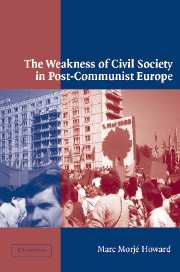Book contents
- Frontmatter
- Contents
- List of Figures
- List of Tables
- Preface
- 1 Introduction
- 2 An Experiential Approach to Societal Continuity and Change
- 3 Civil Society and Democratization
- 4 Post-Communist Civil Society in Comparative Perspective: An Empirical Baseline
- 5 Explaining Organizational Membership: An Evaluation of Alternative Hypotheses
- 6 Why Post-Communist Citizens Do Not Join Organizations: An Interpretive Analysis
- 7 Conclusion
- Appendix A Coding of the Variables
- Appendix B Country Scores on the Main Variables
- Appendix C The Post-Communist Organizational Membership Study (PCOMS) Survey
- Appendix D The In-Depth Interviews
- References
- Index
5 - Explaining Organizational Membership: An Evaluation of Alternative Hypotheses
Published online by Cambridge University Press: 05 June 2012
- Frontmatter
- Contents
- List of Figures
- List of Tables
- Preface
- 1 Introduction
- 2 An Experiential Approach to Societal Continuity and Change
- 3 Civil Society and Democratization
- 4 Post-Communist Civil Society in Comparative Perspective: An Empirical Baseline
- 5 Explaining Organizational Membership: An Evaluation of Alternative Hypotheses
- 6 Why Post-Communist Citizens Do Not Join Organizations: An Interpretive Analysis
- 7 Conclusion
- Appendix A Coding of the Variables
- Appendix B Country Scores on the Main Variables
- Appendix C The Post-Communist Organizational Membership Study (PCOMS) Survey
- Appendix D The In-Depth Interviews
- References
- Index
Summary
INTRODUCTION
Having described and analyzed the range of variation in levels of organizational membership across 31 countries in Chapter 4, I now turn to an analysis of the factors that explain the distinctively low levels of post-communist membership. This chapter presents an analysis of the Post-Communist Organizational Membership Study (PCOMS) survey, which was conducted in 1999 with representative samples in Russia, Eastern Germany, and Western Germany, using the same measure of average number of organizational memberships per person as the previous chapter.
In this chapter, I start by briefly revisiting the main socioeconomic factors developed in Chapter 4, but this time while focusing on the three populations from the PCOMS survey. The West German sample adds a comparative perspective to the East German and Russian samples, and it also enables me to include the variable for “prior communist experience” in the analysis. The results of the PCOMS survey show that, while several of the socioeconomic variables are statistically significant, prior communist experience remains the most powerful explanatory factor.
Although – just as in Chapter 4 – the variable “prior communist experience” is an extremely powerful predictor, substantively, the relationship remains underspecified. This leads to an obvious question: what elements of the communist experience can explain why participation in civil society is so low throughout post-communist Europe today? The final section of this chapter explores this question in greater detail, examining in particular people's mistrust of communist organizations, the persistence of their friendship networks, and their disappointment with post-communism.
- Type
- Chapter
- Information
- The Weakness of Civil Society in Post-Communist Europe , pp. 92 - 120Publisher: Cambridge University PressPrint publication year: 2003



